How to Clean and Disinfect Granite Countertops

By Erin Lindholm
There’s so much to love about granite countertops in a kitchen—from their luster and shine to the natural beauty of the stone, every slab is unique. When properly sealed and maintained, granite countertops are not only beautiful but resist bacteria and stains. On top of that, granite countertops are actually quite easy to keep clean.
The only learning curve is actually understanding how to clean granite countertops. A natural material that’s sealed for durability, granite requires its own (simple) cleaning routine, similar to how hardwood floors need their own TLC. This essential guide covers everything you need to know about how you should clean granite countertops, including cleaning products to avoid; a disinfectant spray you can make at home; and how to remove stains from granite countertops.
Photo via Emily / Shorely Cozy
What to Avoid When Cleaning Granite Countertops
Composed of crystalline and mineral elements such as quartz, mica, and feldspar, granite is a porous stone material naturally—which is why the sealant is so essential.
As long as your granite kitchen counters are well-sealed (and there’s a test to check that, below), one of the most important elements in caring for granite countertops is knowing what not to do. Namely, what types of cleaning products to avoid using on granite and steering clear of scratchy, abrasive scrubbers. As durable as granite is, it needs gentle care! Here’s a short checklist of the types of household cleaning products to avoid using on granite countertops:
- Cleaning products made with bleach or ammonia, such as Lysol Wipes or Windex
- Natural cleaning products made with citrus oil extracts or vinegar, which weaken the sealant over time.
- Abrasive sponges or scrubbers (including steel wool), which will etch, dull, and compromise the sealant over time
Photo via Julie
How to Clean Granite Countertops
It may sound too good to be true, but all granite really needs is a gentle, sudsy scrub with a soft sponge or microfiber cloth, a few drops of dish soap, and water. Focus on one counter area or section of the kitchen at a time, rinsing and wringing out the sponge or cloth thoroughly in between sections so as to not spread crumbs or bacteria. Follow up with a second warm water wipe-down to grab any lingering soapy residue. Dry the granite counters with a soft cloth to prevent water spots and streaking and to boost shine.
Granite Countertop Cleaning Products
Brands including Method, Formula 409, and Target’s Everspring all make safe and gentle spray cleaning products intended for regular use on granite countertops. Weiman’s range of granite cleaners includes everything from daily clean and shine spray to wipes and polishes, and Granite Gold’s trifecta of daily spray, polish, and granite-safe sponge has all your maintenance needs covered. These products are all specifically formulated to keep your kitchen counters streak-free and sparkling without the risk of stripping the sealant or damaging the stone slab.
How to Disinfect Granite Countertops
Every few days, especially if you’re an avid cook, you’ll need to disinfect your countertops to strip them of any lingering germs and bacteria. Rubbing alcohol has powerful disinfectant properties and is also safe for use on granite. Rubbing alcohol is already diluted with water (most bottles are labeled as 70-percent isopropyl alcohol), so there’s no need to mix it with water, but a 50/50 rubbing alcohol and water combination works if you're opting for a milder solution in a disinfectant.
Tools and Materials Needed
- Rubbing alcohol
- Water (optional)
- Essential oils
- Spray bottle
- Microfiber cloths or soft sponge
Combine rubbing alcohol, water (optional), and a few drops of a favorite essential oil in a spray bottle. Spray onto kitchen counters and let sit for three to five minutes. Wipe clean with a lightly damp sponge or microfiber cloth and follow up with a dry cloth.
How to Remove Stains from Granite Countertops
Granite isn’t nearly as porous as marble, but that doesn’t mean it’s impermeable. Depending on the type and severity of stain you’re trying to remove from your counters, one of these baking soda solutions should do the trick.
How to Remove Oil-Based Stains from Granite Countertops
If your granite countertops aren’t sealed or the sealant is wearing thin, common kitchen staples including cooking oil, condiments, and salad dressings may leave dark splotches on your counters. Here's how to remove them.
Tools and Materials Needed
- Baking soda
- Water
- Cleaning cloth/soft scrubbing sponge
- Small bowl
- Spoon for mixing
Combine water and baking soda in a bowl and mix until it turns into a thick paste, adding more of each ingredient as needed for a paste-like texture. Apply the paste onto the stain and gently scrub. After a minute or two, wipe clean with a damp sponge. Repeat if needed until the stain is no longer visible.
How to Remove Water-Based Stains from Granite Countertops
Liquids such as coffee, juice, wine, and even water glasses damp with condensation can leave behind unsightly stains on countertops where the sealant is wearing thin. This paste, which is also made of baking soda, should help lift any water-based stains from the stone.
Tools and Materials Needed
- Baking soda
- Hydrogen peroxide
- Cleaning cloth/soft scrubbing sponge
- Small bowl
- Spoon for mixing
Combine hydrogen peroxide and baking soda in a bowl and mix until a thick paste forms, adding more of each ingredient as needed for a paste-like texture. Apply the fizzing solution onto the stain and gently scrub. Repeat if needed until the stain is no longer visible.
How to Remove Tough Stains from Granite Countertops
If you tried the above methods on a particular stain and the stain still doesn’t lift, the treatment likely needs more time to work.
Apply the same paste mixture as above (whether for an oil- or water-based stain) to the stain and cover with plastic wrap, smoothing out air bubbles and taping down the edges. Let sit at least overnight before rinsing and wiping clean.
If the stain still doesn’t lift, it’s possible the sealant has worn through and the stain is actually in the stone—or the slab was never sealed to begin with. In either case, it’s time to call in some professional help. Contact a local stone and tile specialist to inquire about sealant services; companies that specialize in woodworking restoration services may likely also restore and seal granite countertops, too.
How to Test for Sealant on Granite Countertops
No level of TLC will restore your granite countertops to prime shine once the sealant begins wearing thin and is no longer fully protecting the natural stone underneath. This simple home test indicates whether or not your granite countertops need a new coat of sealant:
Step 1: Pour a small amount of water (not even a spoonful) onto the granite in a few test locations around your kitchen—including high-traffic counter areas (such as adjacent to the sink, stovetop, or kitchen island). Let sit for 30 minutes.
Step 2: Check the test locations. On a well-sealed countertop, the water will still look like a big drop on the counter, ready to be wiped up. A dark ring or watermark indicates that the water has seeped into the stone slab, which means it’s time to reseal. Out of precaution, follow the appropriate steps for water-based stain removal (above).
Resealing granite countertops is a rewarding but somewhat laborious task that requires specific products—such as Granite Gold Sealer Spray, followed up with Granite Gold Polish. The job requires some elbow grease and multiple different applications over two days’ time. Ultimately, you’re re-fortifying the sealant that’s already on the countertops. For natural stone slabs that have never been treated with sealant or more labor-intensive jobs, it might be best to call in the pros.
Photo via Katelyn Fagan
More Granite Countertop Care Tips
Granite countertops are an investment that you want to keep in good condition for as long as you can. Here are some upkeep tips to make sure your granite countertops stay pristine.
- The best way to keep granite countertops clean is with regular, light upkeep. After cooking and eating meals or after-school snacks, wipe down the countertop area(s) most heavily-used with a lightly damp sponge or soft cloth to wipe up crumbs or messes. Follow up with the dish soap cleaner we outlined above or a granite-safe counter spray and dry with a microfiber cloth.
- Liquid spills and any water residue should be cleaned as soon as possible to avoid water spots and any chance of the liquid soaking in and permanently staining your countertops.
- A machine-washable dish drying mat can do double-duty in protecting your granite counters from dripping wet dishes while they dry and also protecting your counters from sink spray and splashes.
- Add even more shine to your granite countertops with a periodic conditioning treatment by buffing the natural stone with a splash of cooking oil (any in your cupboard will do) and a soft cleaning cloth.
Do you have granite countertops? What do you use to clean them?
Enjoyed the project?
Comments
Join the conversation
-
 Att101020612
on Mar 19, 2024
Att101020612
on Mar 19, 2024
Nice post and please provide more information. Thanks for sharing.
-

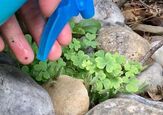

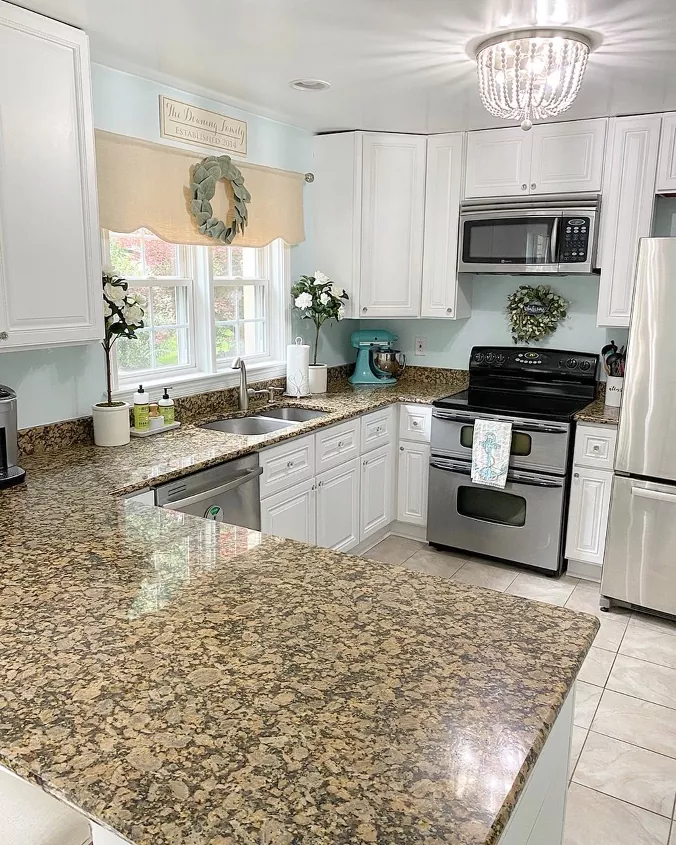



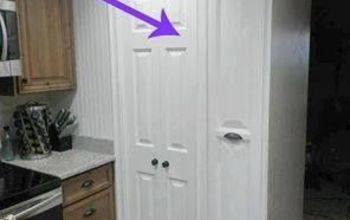


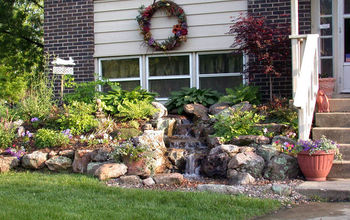
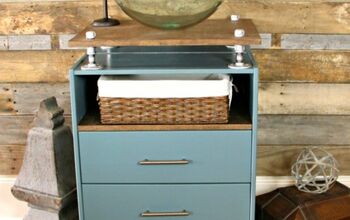
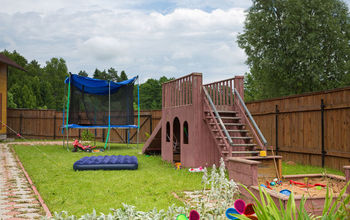
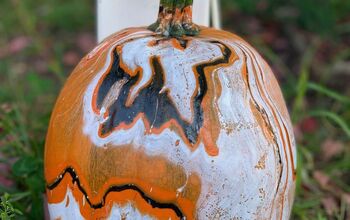
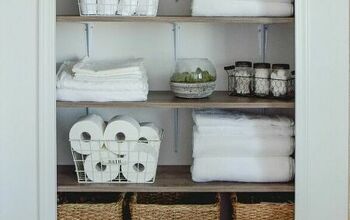
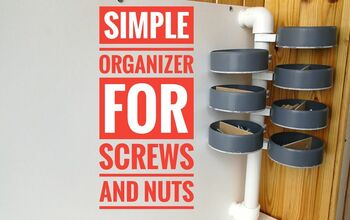
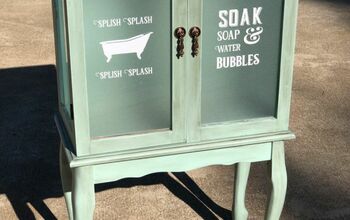
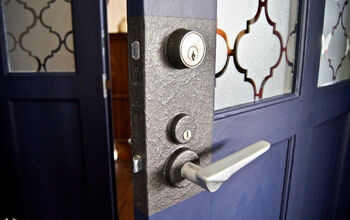
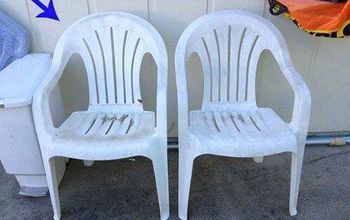

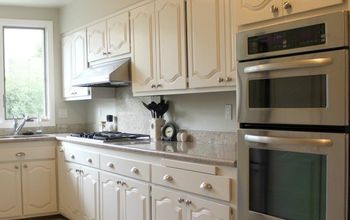

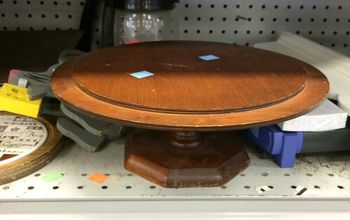
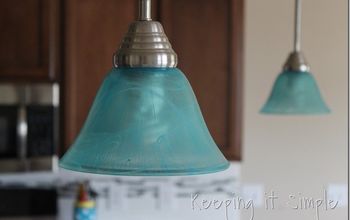
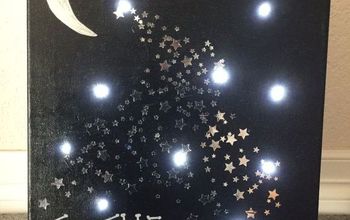
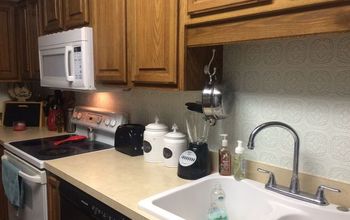
Frequently asked questions
Have a question about this project?